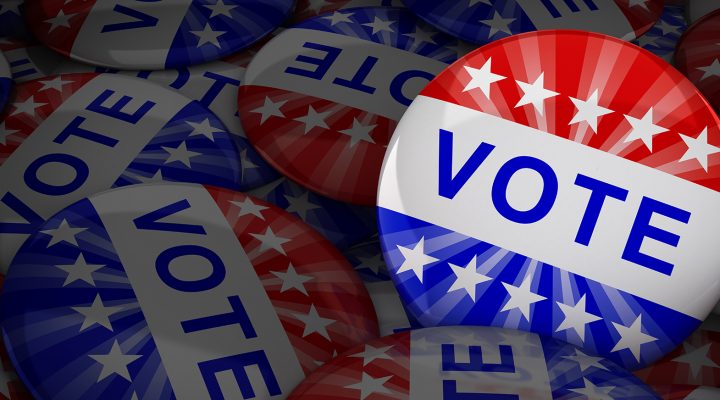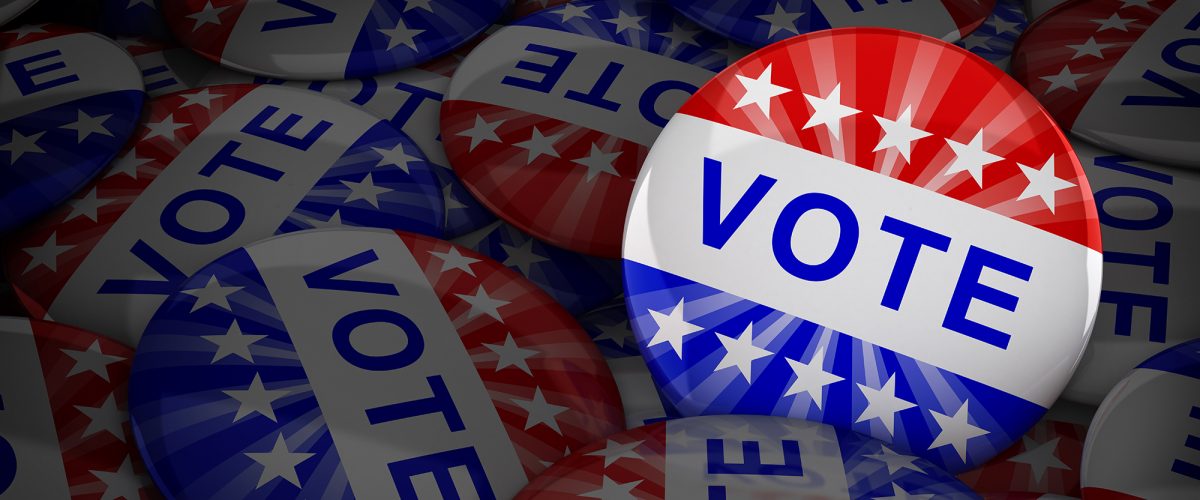Election-related pessimism, paranoia and predictions of political violence are among the key findings of the 14th annual American Values survey, author and pollster Robert P. Jones said.
“One of the things we’re finding is that the political temperature in America is hot and it’s running high. That was so evident throughout the survey, and we’re looking ahead to what is really an unprecedented presidential election,” said Jones, president of Public Religion Research Institute.
Jones reported the key findings of the study during a recent webinar panel discussion jointly hosted by PRRI and the Brookings Institution, the institute’s partner in the August survey of 2,500 Americans.
Joining Jones on the panel were MSNBC political analyst Joy Reid, Johns Hopkins University political scientist Lilliana Mason and Axios race and justice reporter Russell Contreras. The discussion was moderated by E.J. Dionne, a senior fellow in governance studies at Brookings and culture at Georgetown University. Their discussion highlighted the wide partisan gulf separating groups of Americans around the trends uncovered in the report.
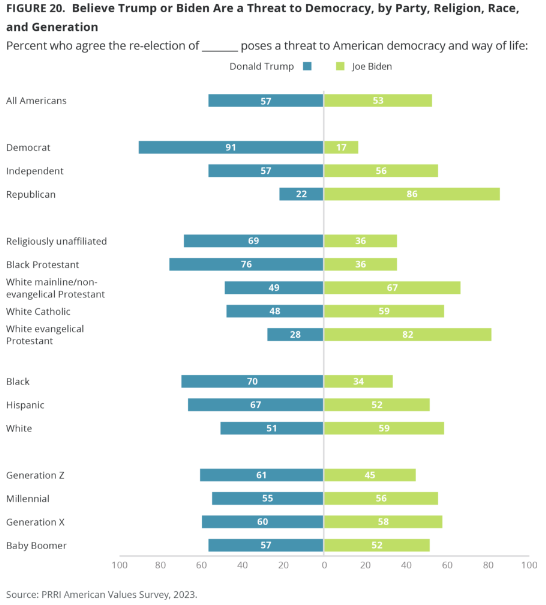
Democracy at stake
Dionne said he was struck by the survey’s finding that most Americans, regardless of party affiliation, believe the future of democracy is at stake in the 2024 presidential election.
According to the study, 75% of U.S. adults agree democracy is at risk, including 84% of Democrats, 77% of Republicans and 73% of independents. Similar agreement was found across racial and religious groups. “It is one of the few things in the survey that all partisans agree on,” Jones added.

Robert P. Jones
But they don’t agree on why American democracy is in jeopardy, he added, with 91% of Democrats, 57% of independents and 22% of Republicans saying Donald Trump’s potential return to the White House is the biggest threat. In contrast, 86% of Republicans, 56% of independents and 17% of Democrats believe President Joe Biden’s reelection would be dangerous for democracy.
Overall, 57% of Americans believe Trump is the threat compared to 53% who consider Biden the threat.
‘Culture and way of life’
More negativity was detected when respondents were asked if the U.S. culture and way of life have changed for better or worse since the 1950s, and if they believe the country’s best days are behind it, Jones said. “Americans are fairly pessimistic on those questions, but there are ginormous partisan divides on both these questions.”
PRRI found 55% believe the American way of life has changed for the worse since the 1950s, versus 44% who believe it has improved. Heavily negative on the question were 73% of Republicans, 57% of independents and 34% of Democrats.
While a thin majority (52%) of respondents said the nation’s best days are behind it, 67% of Republicans and 55% of independents hold that view compared to only 35% of Democrats.
“We have white Christian groups at the top here. Evangelicals, even Mainline, non-evangelical Protestants and white Catholics are all more likely to have a pessimistic view, particularly about how the country has changed since the 1950s,” Jones said.
The study found 77% of white evangelicals believe the country has diminished since the 1950s, followed by 60% of Mainline and other non-evangelical Protestants, and by 57% of white Catholics.
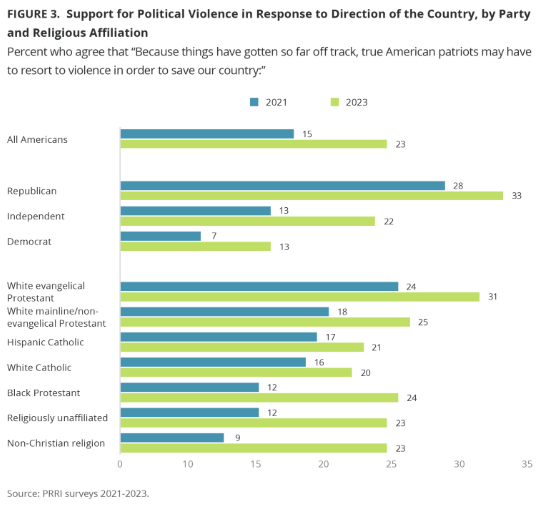
Political violence
Another trend Jones said he found disturbing is the growing acceptance of political violence: “We find considerable support for the idea that true American patriots may have to resort to violence in order to save the country because things have gotten so far off track.”
Nearly a quarter of Americans (23%) believe such violence may be needed to save the nation, compared to 15% who agreed with the idea in 2021.
Expressing that view in the current survey were 33% of Republicans, 22% of independents and 13% of Democrats. Agreement was up across the board since 2021, when 28% of Republicans and 7% of Democrats believed violence may be necessary to save the country.
Support for the notion was even higher among some religious groups, including 31% of white evangelicals, 25% of white Mainline/non-evangelicals, 24% of Black Protestants and 23% of both non-Christian and religiously unaffiliated Americans. Hispanic Catholics (21%) and white Catholics (20%) also expressed that view.
“White Catholics and Latino Catholics are a little bit under the national average, not by a lot, but it’s white evangelicals that are jumping out as the group most likely to hold this view,” Jones said.
“Republicans who have favorable views of Trump (41%) are nearly three times as likely as Republicans who have unfavorable views of Trump (16%) to agree that true American patriots may have to resort to violence to save the country.”
Opinions about Trump also influenced beliefs about the appropriateness of political violence, the survey reported. “Republicans who have favorable views of Trump (41%) are nearly three times as likely as Republicans who have unfavorable views of Trump (16%) to agree that true American patriots may have to resort to violence to save the country.”
The percentages increased further when respondents were asked if they believe the 2020 election was stolen from the former president. Among that demographic, 46% said they believe violence may be needed to save the nation, compared to 13% among those who don’t believe the election was stolen.
Among those who believe America was intended by God as a promised land for European Christians, four in 10 said political violence may be necessary.
The percentages were the same for those who believe society has become too feminine and soft and those who believe immigrants are invading the U.S. to replace its culture and ethnic makeup. The number was slightly lower (three in 10) for those who believe reports of police violence against Black Americans are isolated events.
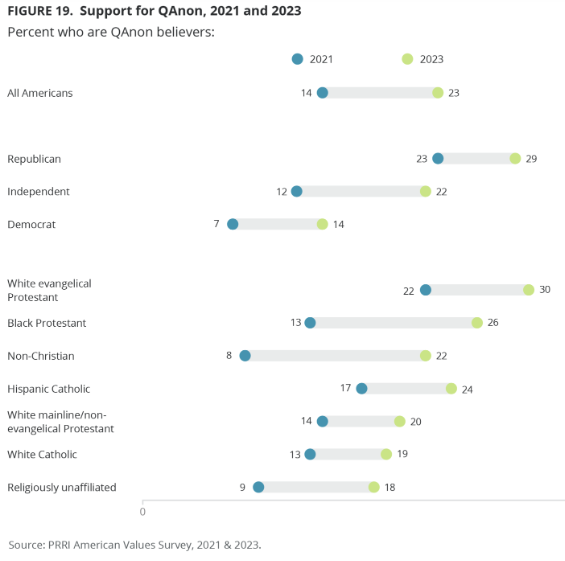
QAnon beliefs
Researchers also documented an increase in QAnon beliefs since earlier surveys. To determine that, respondents were asked if they believe government, media and financial institutions are controlled by Satan-worshiping pedophiles who also operate a global child sex trafficking operation. They also were asked if they think a storm is coming to swipe elites from power and if American patriots may need to resort to violence to restore the nation.
Jones said it’s disturbing to see 25% of Americans believe pedophiles are running government and industry, compared to 15% in 2021, while 27% believe a storm is coming to change government and business leadership, up from 20% two year ago. Among those who hold QAnon beliefs, 23% say patriotic violence may be necessary to save the country, compared to 15% in 2021.
“This sounds familiar. It actually borrows from Christian theology, this kind of apocalyptic viewpoint,” Jones said. “And the other measure that’s baked in here is the measure on violence, this idea that true American patriots may have to save the country.”
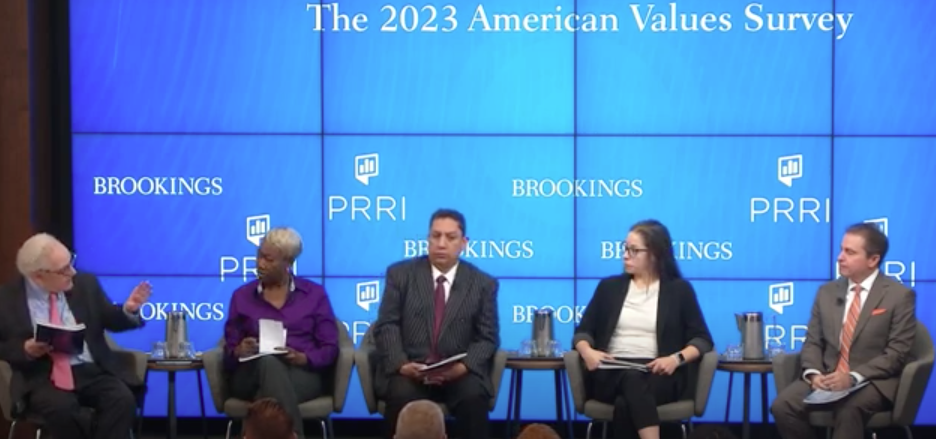
Reid’s commentary
Reid said she was drawn to the issue of patriotic violence tracked by the study. “The question I asked myself is violence for what? Violence to what end?”
She noted a third of Republicans say violence may be necessary, and a majority of them also believe the nation’s best days are behind it. They believe American culture must be restored.
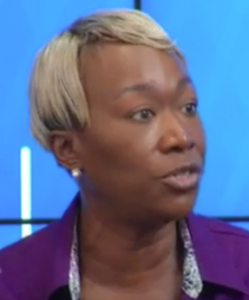
Joy Reid
“It does bring to mind the sort of leading question of what people think we need violence for. If you put together what’s happening in the news cycle, it’s violence to install the leader of Republicans’ preference, which would be Donald Trump — which is what he wants.”
It’s also distressing that a growing number of Americans do not have confidence that the democratic process can address their fundamental concerns, she said.
For Democrats, those concerns include wealth inequality, climate change and the economy. For Republicans, the concerns are cultural, including issues of gender and sexuality and religious adherence, Reid noted. “And so, we’re at a fundamental problem where one party has concerns that are fundamentally political things that politics can solve, and the other party has concerns that are ephemeral and that are emotional, which politics actually can’t solve.”
Contreras’ commentary
Contreras said he was initially surprised by the study’s findings around support for political violence. But a Native American friend quickly reminded him of the nation’s long history of racial massacres and genocide.

Russell Contreras
“We’ve seen this before,” Contreras said. “Think of Tulsa, Rosewood, Wounded Knee. Whenever the country sees any sort of threats from demographic change, especially from people of color, violence will occur.”
The growing embrace of violence captured in the survey also makes sense when considered against the thread of white Christian nationalism that runs through U.S. history, Contreras said.
“This country for years has been a haven for European white Christians. And the belief that that is slipping away, that it is being redefined — people are acting the way they are violently. That’s one of the things that stood out. The other was the idea of this once-fringed belief of the Replacement Theory. It is now supported by around 40% of Americans.”
Mason’s commentary
Mason described Jones’ statistics on patriotic violence as “a real gut punch” and also consistent with her research into attitudes toward political violence.

Lilliana Mason
“We’re worried about two things. We’re worried about the difference between partisans and the amount of violence that they endorse, and we’re also worried about the change over time.”
Like the American Values survey, Mason said her studies have documented an increase, from 2017 to 2022, in the number of Democrats and Republicans who believe it is acceptable to use violence to achieve political goals.
But her surveys also have asked respondents to define what they mean when they endorse the use of violence, she added. “Democrats and Republicans are quite different on what they meant to begin with. Democrats are much bigger fans of property damage. Republicans generally are more likely to be thinking about armed resistance.”
When asked if their definition of violence included killing people, 20% said it is acceptable to commit homicide to achieve political aims, Mason said. “Not everyone there is thinking, ‘I want to murder other people.’ So, that’s good. I’m trying to find the silver lining.”
It’s important to remember that most people exaggerate the violent tendencies of their opponents, she said. “What political scientists have found, over and over again, is that when we perceive the other side to be violent, we become more accepting of violence ourselves. In addition, most Democrats and Republicans believe the other side is more violent than they actually are.”
American Promised Land
The deep-seated belief that America is a divinely ordained promised land for whites is colliding with that of a pluralistic, democratic society, and the tension has more people considering the value of violence, Jones said.
The deep-seated belief that America is a divinely ordained promised land for whites is colliding with that of a pluralistic, democratic society, and the tension has more people considering the value of violence, Jones said.
The PRRI survey found 38% of Americans believe “immigrants are invading our country and replacing our cultural and ethnic background.” That’s compared to 57% who disagree. But 65% of Republicans embrace the Great Replacement Theory, compared to 15% of Democrats and 37% of independents.
“White Christian subgroups are notably more likely than other religious groups to share this perception of immigrants as an invading force: 61% of white evangelical Protestants, 51% of white Catholics, and 46% of white Mainline/non-evangelical Protestants,” PRRI reports.
“It’s no wonder we’ve got this volatile cocktail, and I think we’re at this dangerous inflection point in our history,” Jones said. “We are being tested in many ways to see which of these two visions of the country are the ones that we’re going to ultimately embrace and move forward into. And there’s a real fight about that.”

